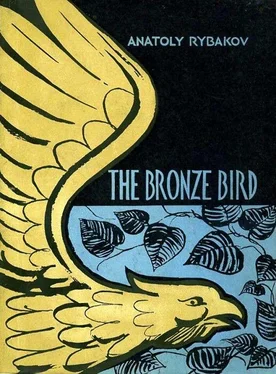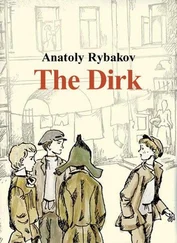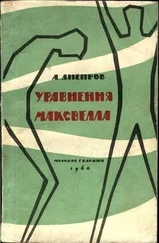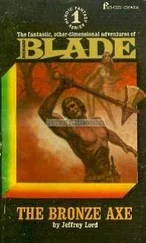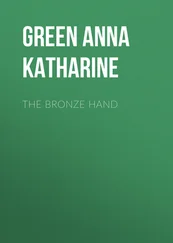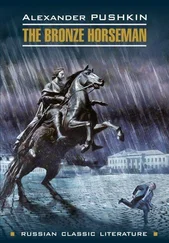Anatoly Rybakov - THE BRONZE BIRD
Здесь есть возможность читать онлайн «Anatoly Rybakov - THE BRONZE BIRD» весь текст электронной книги совершенно бесплатно (целиком полную версию без сокращений). В некоторых случаях можно слушать аудио, скачать через торрент в формате fb2 и присутствует краткое содержание. Город: Moscow, Год выпуска: 1956, Издательство: Foreign Languages Publishing House, Жанр: Детские приключения, Детектив, Исторические приключения, на английском языке. Описание произведения, (предисловие) а так же отзывы посетителей доступны на портале библиотеки ЛибКат.
- Название:THE BRONZE BIRD
- Автор:
- Издательство:Foreign Languages Publishing House
- Жанр:
- Год:1956
- Город:Moscow
- ISBN:нет данных
- Рейтинг книги:5 / 5. Голосов: 1
-
Избранное:Добавить в избранное
- Отзывы:
-
Ваша оценка:
- 100
- 1
- 2
- 3
- 4
- 5
THE BRONZE BIRD: краткое содержание, описание и аннотация
Предлагаем к чтению аннотацию, описание, краткое содержание или предисловие (зависит от того, что написал сам автор книги «THE BRONZE BIRD»). Если вы не нашли необходимую информацию о книге — напишите в комментариях, мы постараемся отыскать её.
THE BRONZE BIRD — читать онлайн бесплатно полную книгу (весь текст) целиком
Ниже представлен текст книги, разбитый по страницам. Система сохранения места последней прочитанной страницы, позволяет с удобством читать онлайн бесплатно книгу «THE BRONZE BIRD», без необходимости каждый раз заново искать на чём Вы остановились. Поставьте закладку, и сможете в любой момент перейти на страницу, на которой закончили чтение.
Интервал:
Закладка:
They were being driven out. What a disgrace!
But how could they go? To go meant admitting their guilt. What kind of memory would they leave behind in the village? How could they throw up everything? The Young Pioneer detachment that was about to be organized, the illiteracy-abolition class and the club, now that it had been repainted.
How could they drop all that? Because they had been slandered! The only reason for the slander was to drive them out of this neighbourhood. That meant they were in somebody's way. No, they would not surrender so easily! They would prove their innocence.
It was decided that Misha and Slava would go to town and try to get Serov's order waived. The more so that the "countess" had already gone there and would most certainly fling more mud at the troop. Genka was appointed to act as leader in Misha's absence.
"Look, Genka," Misha said to him, "until I return you're not to leave the camp under any pretext. No matter who orders you."
"Don't worry," Genka replied, "nobody will evict us." Then, with a theatrical gesture, he added, "Only over my dead body."
Chapter 44
THE STRUGGLE CONTINUES
The freight-and-passenger train crawled painfully along, stopping at every siding. From the window of the carriage the landscape was monotonously familiar: railway guards' huts, telegraph posts, flocks of sparrows on the wires, lowered turnpikes with the switchman holding up a rolled-up yellow flag, the village on the hill-side, the pond with an embankment and ducks swimming in it, a bearded man with a small shining milk-can in his hand standing on the station platform, workers with crowbars and spades repairing the track, an old woman with a small flower-patterned bundle walking slowly along a path, vacationers on bicycles.
However, Misha and Slava could not enjoy the landscape: they were stealing a ride.
Misha knew of quite a few ways of travelling in this fashion. The simplest was to find a seat in the middle of the carriage and, as soon as the inspector appeared, to dart over to the opposite side and merge with the merry throng of other stowaways.
Of late, the inspectors had caught on to that trick and now entered the carriage in pairs, one from each end. That was why this time Misha chose the most difficult method. While the train was in motion, he stood on the steps, but the moment it pulled into a siding he hopped down, waited until he saw what carriage the inspectors boarded and acted accordingly. At first, he made his way from one end of the train to the other, then he got off at the first stop, ran to the carriage where the inspectors had checked the tickets and calmly sat down. He had become so adept at this that he could tell exactly when the inspectors would appear in one carriage or another.
In this fashion, he and Slava reached the town. Slava was not a coward, but he was touchy and timid. It seemed to him that everybody was aware that he was a stowaway and that feeling made him ashamed. Misha was also ashamed. But, as was always the case when there were difficulties, he gave theoretical grounds for what he did.
"Of course, it isn't right to steal rides," he said, "but stowaways are phenomena of the period of rehabilitation. When our country will be rich nobody will ride trains without tickets."
"If people were to reason like that, nobody would buy tickets. You mustn't forget that the railways are supposed to be self-supporting," Slava protested.
Discussing this problem, the boys manoeuvred, changing from one carriage to another, because this time there were many inspectors on the line. They kept changing carriages until one circumstance drew their attention.
They saw the "countess."
The carriage was crowded. The only place where people were lying was on the luggage rack. On the upper berths they were sitting with their feet dangling before the noses of the people sitting below them. It was hot and stuffy. The "countess," pressed into a corner, was dozing. She was sitting by an open window and the black coal-dust was settling on her face.
The boys knew that the "countess" was also going to town, and because of that they did not attach any importance to the fact that she was in the same train. But in another carriage they saw the boatman.
Why were the two of them going to town? And in different carriages?
"It's possible that this is simply a coincidence," Slava suggested.
Misha shook his head.
"I don't think so," he said. "We'll watch them and see if they're going there separately or together."
When the train came to a stop in the town, the passengers filled the wet platform. There had just been a short summer rain and the raindrops were glistening on the railings, the rubbish cans, on the station girders.
"I'll shadow the boatman," Misha whispered, "and you follow the 'countess.' Only keep your eyes peeled."
Without losing sight of the "countess" and the boatman, the boys slowly made their way through the crowd. The "countess" and the boatman walked separately: she in front and he following at a considerable distance. The boys had a good view of him, but the "countess" kept appearing and disappearing in the crowd.
For a short time the square in front of the station teemed with the stream of people from the train. The cabbies, sitting in their tall, clumsy cabs, called out for passengers. Whenever one of the cabs moved off along the cobbled road, its black, folding, harmonica-like back bobbed up and down. Water-sellers rushed about with big bottles of tap-water coloured with cheap syrup. There were hawkers with trays on their chests. Waifs, "the last of the Mohicans," lay in the shade of the station, apparently dreaming but actually keenly watching for an opportunity to snatch a piece of luggage.
The "countess" disappeared, but the boys kept the boatman in sight. He turned into one of the streets and the boys went after him, keeping at a respectful distance. Soon they again caught sight of the "countess."
It did not take them long to see that the boatman was sticking doggedly to the "countess." He did not try to get near her, but kept close to the walls of buildings and very ingeniously hid behind the pedestrians in front of him. When the "countess" stopped at a street corner to let a cart train pass, the boatman also stopped, hiding behind the porch of a house and making believe he was rolling a cigarette. The boys barely managed to conceal themselves behind a newspaper kiosk.
Thus they progressed-the boatman behind the "countess" and the boys behind the boatman-until they reached the street where stood the Museum of Regional Studies, which Misha had visited in company with Genka and Boris Sergeyevich.
It was a quiet, little-frequented street. From behind a corner, the boys saw the "countess" entering the museum and the boatman lurking behind a projecting wall and watching her. Then the boatman crossed the street and lay down on a lawn in the shade of a tree.
For some time, the boys stood in their hiding-place. Then they went to a side-street, where they conferred on what to do next.
"Who knows how long the 'countess' will be in the museum," said the sober-minded Slava. "She might be there all day. Then why stay here? We've got more important things to do."
But Misha did not agree. He was not prepared to let a chance like this slip through his fingers. It would have been a different matter if the "countess" had come here alone. In that case, the explanation would have been that she had come to take a look at the manor-house furnishings. But why was the boatman, her faithful servant and accomplice, following her? There was something, something very important in this.
"I'll go and see Serov alone," Misha said, "and you stay here and try and find out why the countess came to the museum and why the boatman is shadowing her."
Читать дальшеИнтервал:
Закладка:
Похожие книги на «THE BRONZE BIRD»
Представляем Вашему вниманию похожие книги на «THE BRONZE BIRD» списком для выбора. Мы отобрали схожую по названию и смыслу литературу в надежде предоставить читателям больше вариантов отыскать новые, интересные, ещё непрочитанные произведения.
Обсуждение, отзывы о книге «THE BRONZE BIRD» и просто собственные мнения читателей. Оставьте ваши комментарии, напишите, что Вы думаете о произведении, его смысле или главных героях. Укажите что конкретно понравилось, а что нет, и почему Вы так считаете.
